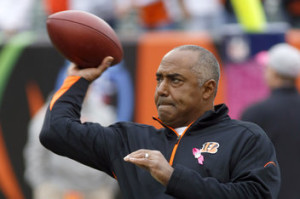Marvin Lewis has coached the Bengals for ten seasons. To his credit, Lewis has helped resurrect the worst franchise of the 1990s; on the other hand, Lewis has not won a playoff game in ten years with the Bengals. That’s unheard of in this era where coaches are expected to win and win big right away. No other active coach has gone even five straight seasons with his current franchise without a playoff victory. At the end of the 2012 year, four coaches — Andy Reid in Philadelphia, Jim Schwartz in Detroit, and Norv Turner in San Diego — had gone four straight years, and Reid and Turner were both fired after the season. Schwartz was given a longer leash after he inherited an 0-16 team, but he is now on the hot seat. Only three others coaching at the end of 2012 had gone even three straight years for the same team without a playoff win — Buffalo’s Chan Gailey, Mike Shanahan in Washington, and Ken Whisenhunt in Arizona. Shanahan made the playoffs last year but lost, while Gailey and Whisenhunt were both replaced. [1]Jason Garrett and Leslie Frazier technically meet the requirement, too, but they only coached for the second half of the season in 2010.
Prior to the Super Bowl era, there was only one playoff game a year (other than playoff games to break ties). Since 1966, Lewis is one of just two coaches to coach one team for a decade and fail to win a playoff game. [2]If you want to look before the Super Bowl era, there were two longer streaks. Steve Owen was the Giants head coach from 1931 to 1953. He compiled a 151-100-17 record and won two championships with … Continue reading The 11th, the elder Jim Mora, was fired by the New Orleans Saints in his 11th year after a 2-6 start. The table below shows each coach since 1966 who was the head coach for the same team for five straight years and failed to win a playoff game during that stretch. The “First Yr” and “Last Yr” columns show the first and last years of the streaks, not of the coach’s tenure. Coaches who were fired in the middle of their last season are marked by an asterisk, while coaches whose reign started in mid-season (but who are treated as if they coached the entire season) are marked with a “+” sign.
[continue reading…]
References
| ↑1 | Jason Garrett and Leslie Frazier technically meet the requirement, too, but they only coached for the second half of the season in 2010. |
|---|---|
| ↑2 | If you want to look before the Super Bowl era, there were two longer streaks. Steve Owen was the Giants head coach from 1931 to 1953. He compiled a 151-100-17 record and won two championships with New York, but those were the only two seasons he won a playoff game. The last fifteen years of his coaching career he did not win a playoff game. Bears owner/coach George Halas did not win a playoff game from 1947 to 1962. That was a stretch of fourteen seasons (he did not coach in ’56 or ’57), and it only included one playoff loss. |

